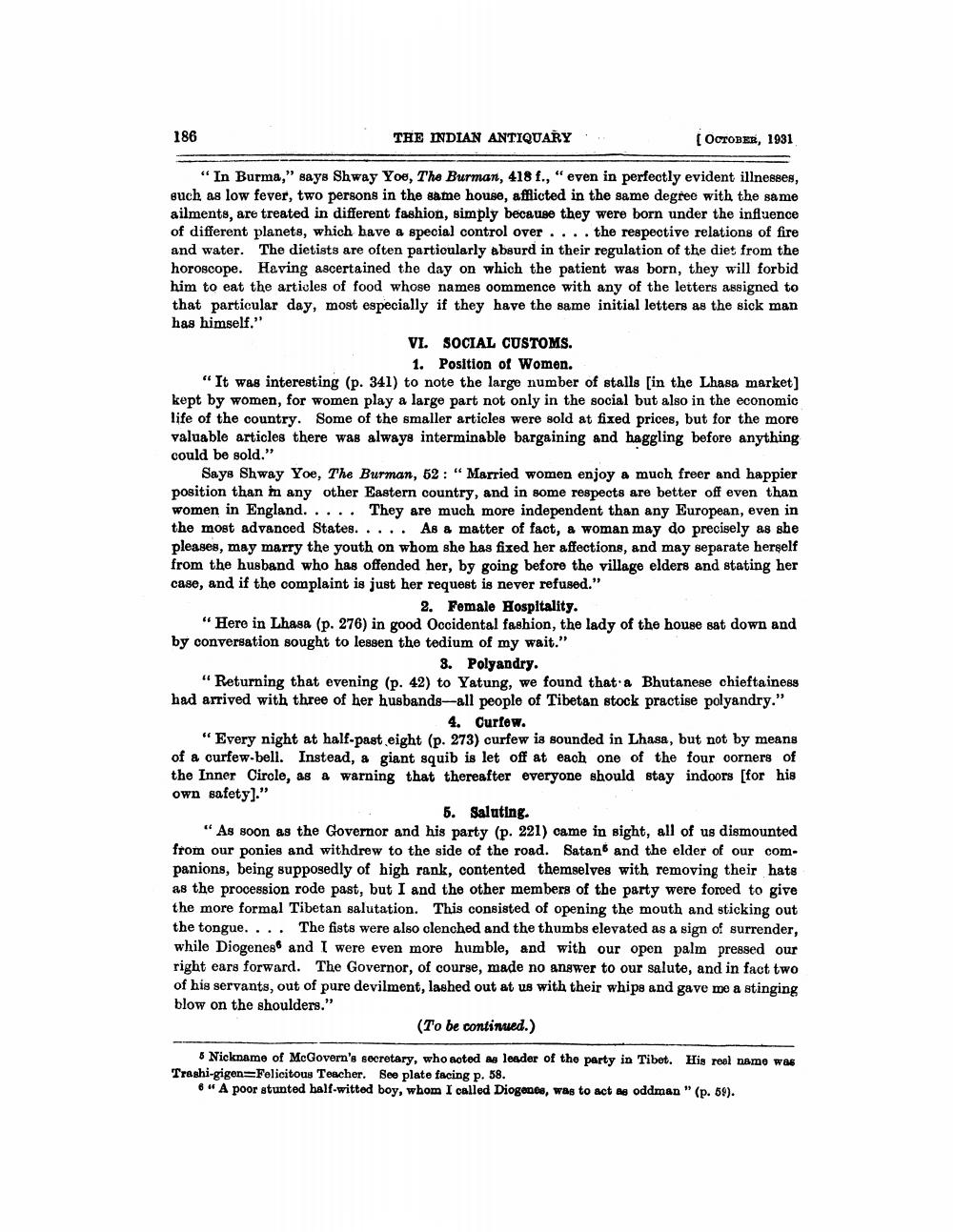________________
186
THE INDIAN ANTIQUARY
66
"In Burma," says Shway Yoe, The Burman, 418 f., even in perfectly evident illnesses, such as low fever, two persons in the same house, afflicted in the same degree with the same ailments, are treated in different fashion, simply because they were born under the influence of different planets, which have a special control over. . . . the respective relations of fire and water. The dietists are often particularly absurd in their regulation of the diet from the horoscope. Having ascertained the day on which the patient was born, they will forbid him to eat the articles of food whose names commence with any of the letters assigned to that particular day, most especially if they have the same initial letters as the sick man has himself."
[OCTOBER, 1931
VI. SOCIAL CUSTOMS. 1.
Position of Women.
"It was interesting (p. 341) to note the large number of stalls [in the Lhasa market] kept by women, for women play a large part not only in the social but also in the economic life of the country. Some of the smaller articles were sold at fixed prices, but for the more valuable articles there was always interminable bargaining and haggling before anything could be sold."
Says Shway Yoe, The Burman, 52: "Married women enjoy a much freer and happier position than in any other Eastern country, and in some respects are better off even than women in England. . . . . They are much more independent than any European, even in the most advanced States..... As a matter of fact, a woman may do precisely as she pleases, may marry the youth on whom she has fixed her affections, and may separate herself from the husband who has offended her, by going before the village elders and stating her case, and if the complaint is just her request is never refused."
2. Female Hospitality.
"Here in Lhasa (p. 276) in good Occidental fashion, the lady of the house sat down and by conversation sought to lessen the tedium of my wait."
8. Polyandry.
"Returning that evening (p. 42) to Yatung, we found that a Bhutanese chieftainess had arrived with three of her husbands-all people of Tibetan stock practise polyandry." 4. Curfew.
"Every night at half-past eight (p. 273) curfew is sounded in Lhasa, but not by means of a curfew-bell. Instead, a giant squib is let off at each one of the four corners of the Inner Circle, as a warning that thereafter everyone should stay indoors [for his own safety]."
5. Saluting.
"As soon as the Governor and his party (p. 221) came in sight, all of us dismounted from our ponies and withdrew to the side of the road. Satan and the elder of our companions, being supposedly of high rank, contented themselves with removing their hats as the procession rode past, but I and the other members of the party were forced to give the more formal Tibetan salutation. This consisted of opening the mouth and sticking out the tongue. . . . The fists were also clenched and the thumbs elevated as a sign of surrender, while Diogenes and I were even more humble, and with our open palm pressed our right ears forward. The Governor, of course, made no answer to our salute, and in fact two of his servants, out of pure devilment, lashed out at us with their whips and gave me a stinging blow on the shoulders."
(To be continued.)
5 Nickname of McGovern's secretary, who acted as leader of the party in Tibet. His real name was Trashi-gigen Felicitous Teacher. See plate facing p. 58.
"A poor stunted half-witted boy, whom I called Diogenes, was to act as oddman" (p. 59).




